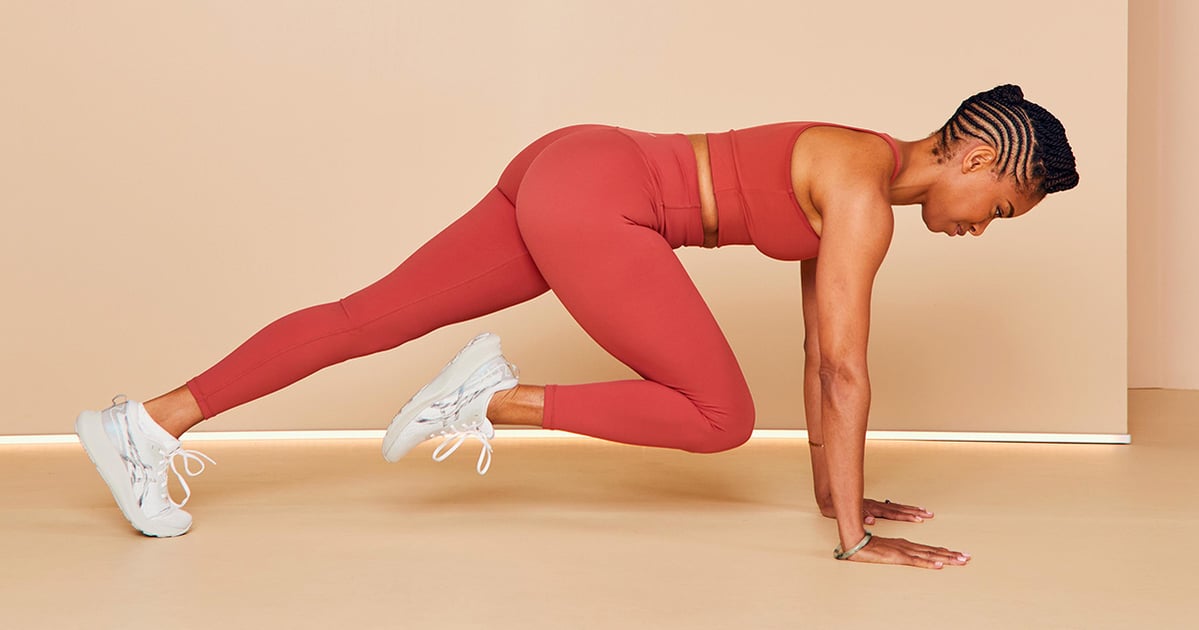Here’s a myth about HIIT workouts: they’re only for the super fit. The misconception probably comes from the name. High-intensity interval training sounds, well, intense. But, “HIIT is absolutely beginner friendly. I do HIIT with an 80-year-old client!” says Danielle Gray, CPT, SFC, CES, CKT, celebrity trainer and founder of Train Like A Gymnast. What is “high intensity” is subjective, Gray notes, which makes HIIT workouts accessible to everyone.
What Is HIIT?
By definition, high-intensity interval training is a workout that combines periods of high-intensity exercise – ones that get your heart rate up to about 80% of its max – with periods of lower-intensity movements, to let your heart rate slow back down again.
What Are the Benefits of HIIT?
In terms of physical benefits of fitness, HIIT is not “better” than any other type of exercise. But it is more efficient. And that’s one of its biggest perks – that it can net you major physical and mental gains in a very short amount of time. By pushing yourself hard for short bursts, interspersed with quick recovery periods, you’re able to achieve the same cardiorespiratory effects as exercising at a medium intensity for a longer period of time. “I use it a lot for busy people,” Gray says.
It also doesn’t require much by way of equipment or space (as this 20-minute, small-space HIIT workout proves). You can do HIIT with weights, gliders, resistance bands, and other gear – but all you really need is your body.
HIIT typically combines cardio and strength training, which means it has positive effects on your muscle mass as well as your aerobic fitness levels.
And like all movement, HIIT can have several different physical perks. A 2021 study in the International Journal of Environmental Research and Public Health points to a growing body of evidence that interval training can improve your endurance, the functioning of your metabolism, insulin sensitivity, and cognitive functions. Research also points to its ability to decrease the risk of heart-related diseases, breast cancer, osteoarthritis, and rheumatoid arthritis.
What’s more, people tend to enjoy HIIT more than medium intensity workouts, according to a 2018 analysis of 235 studies published in the journal PLOS One. They also tend to stick with them, research from 2019 found.
What HIIT Beginners Should Know
Ideally, you’ll have talked to a doctor and gotten cleared to try out HIIT before beginning.
Other than that, Gray simply encourages beginners – and, really, anyone who’s participating in HIIT – to be prepared to listen to their bodies, and to feel comfortable finding alternate exercises as needed.
If a workout calls for a jump rope interval, and you don’t have a jump rope, try substituting high knees. If you have achy knees and can’t jump, try squatting, and pushing yourself onto your tip-toes as you stand up instead, Gray suggests.
Remember: high intensity is subjective, and what gets you to 80% of your max heart rate might be different than what it takes for someone else to get there.
About This 45-Minute HIIT Workout
This 45-minute workout is designed by ACE-certified fitness instructor John Kersbergen. It combines cardio with strength training moves – and while it’s long, it’s a great starting place for anyone interested in HIIT because it can be adjusted to suit your fitness level and your goals.
“Instead of doing four rounds of each workout, do two,” Gray suggests. Or start by doing just half of the exercises, and work your way up to the full plan.
The workout is made up of Tabata-style intervals, which is a type of HIIT that involves going all out for 20 seconds, resting for 10 seconds, and repeating that eight times for a total of four minutes. But this training plan calls for stringing nine of those intervals back-to-back, with a few one-minute rest periods sprinkled in.
Again, you don’t have to complete the full, 45-minute workout to get some major benefits. But if you have the wherewithal, it’s there for the taking. So put on your most sweat-wicking leggings and sports bra and get ready to work.
A 45-Minute HIIT Workout For Any Fitness Goal
Equipment needed: jump rope and medium- to heavy-weight dumbbells (here are tips for choosing the right weight), both optional. Also have a way to keep track of time.
Directions: Start by completing the warm up circuit below as many times as you can in five minutes.
Then, begin the first block of the workout. Do 20 seconds of the first exercise, rest for 10 seconds; complete 20 seconds of the second exercise, rest for 10 seconds; then repeat the two-move circuit for four rounds total.
Repeat this format for each block, taking a longer, one-minute rest where indicated.
Cool down after the workout with full-body stretches.
Warmup: 5 minutes
Repeat this circuit as many times as you can in five minutes.
- 10 jumping jacks
- 10 forward backward lunges (5 per side)
- 10 plank jacks
Rest: 1 minute
Walk in place.
Interval 1: Cardio
Repeat 4x
- 20 seconds jump rope, 10 seconds rest
- 20 seconds mountain climbers, 10 seconds rest
Interval 2: Legs
Repeat 4x
- 20 seconds air squats, 10 seconds rest
- 20 seconds goblet squats, 10 seconds rest
Interval 3: Arms
Repeat 4x
- 20 seconds triceps push-ups, 10 seconds rest
- 20 seconds dumbbell thrusters, 10 seconds rest
Rest: 1 minute
Walk in place.
Interval 4: Core
Repeat 4x
- 20 seconds plank with bunny hops, 10 seconds rest
- 20 seconds V-sits, 10 seconds rest
Interval 5: Cardio
Repeat 4x
- 20 seconds jump rope, 10 seconds rest
- 20 seconds mountain climbers, 10 seconds rest
Interval 6: Plyo
Repeat 4x
- 20 seconds burpees, 10 seconds rest
- 20 seconds split lunge jumps, 10 seconds rest
Rest: 1 minute
Walk in place.
Interval 7: Back
Repeat 4x
- 20 seconds Superman lifts, 10 seconds rest
- 20 seconds plank with row, 10 seconds rest
Interval 8: Butt
Repeat 4x
- 20 seconds skater hops, 10 seconds rest
- 20 seconds deadlifts, 10 seconds rest
Interval 9: Cardio
Repeat 4x
- 20 seconds jump rope, 10 seconds rest
- 20 seconds mountain climbers, 10 seconds rest
Rest: 1 minute
Walk in place, followed by the cool-down of your choice.
Keep reading for a description of each move.
– Additional reporting by Mirel Zaman




